Unit 10 I'd like some noodles. Section A (1a-2d)课件(共46张PPT) 2023-2024学年人教版英语七年级下册
文档属性
| 名称 | Unit 10 I'd like some noodles. Section A (1a-2d)课件(共46张PPT) 2023-2024学年人教版英语七年级下册 | 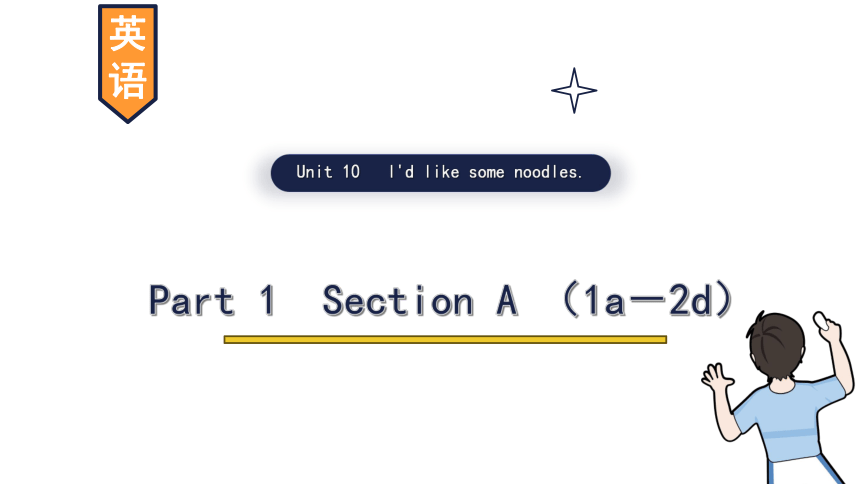 | |
| 格式 | pptx | ||
| 文件大小 | 540.2KB | ||
| 资源类型 | 教案 | ||
| 版本资源 | 人教新目标(Go for it)版 | ||
| 科目 | 英语 | ||
| 更新时间 | 2024-04-13 09:18:45 | ||
图片预览

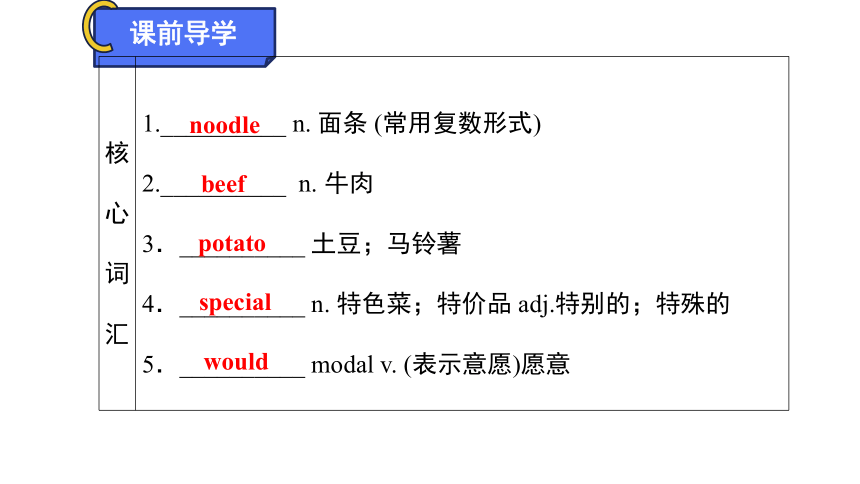
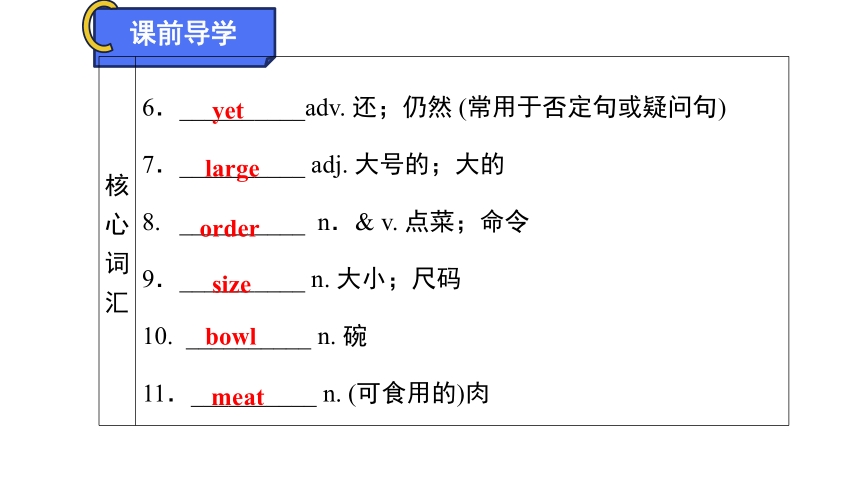
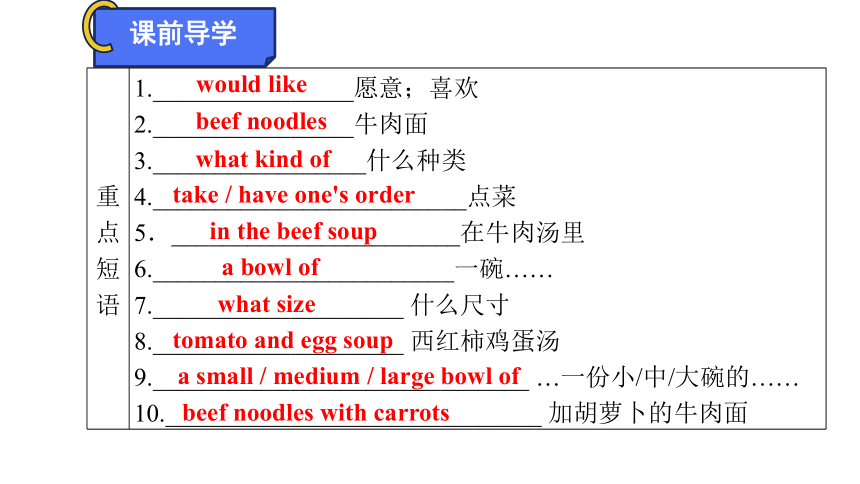
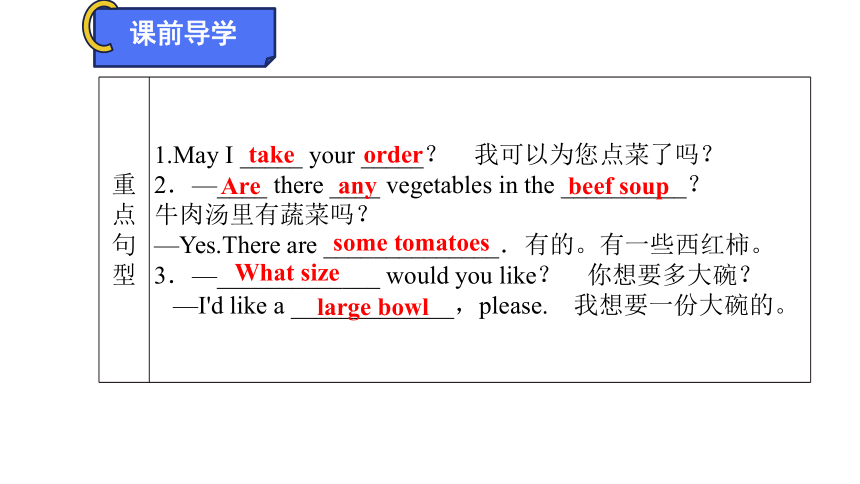
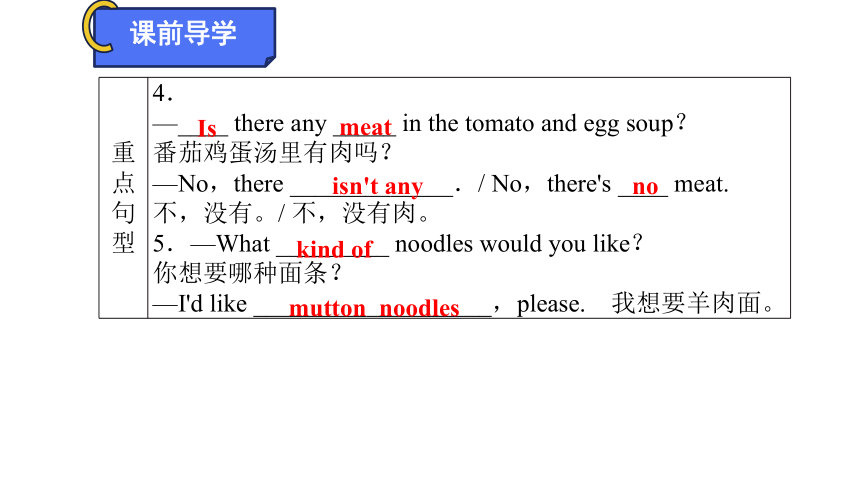
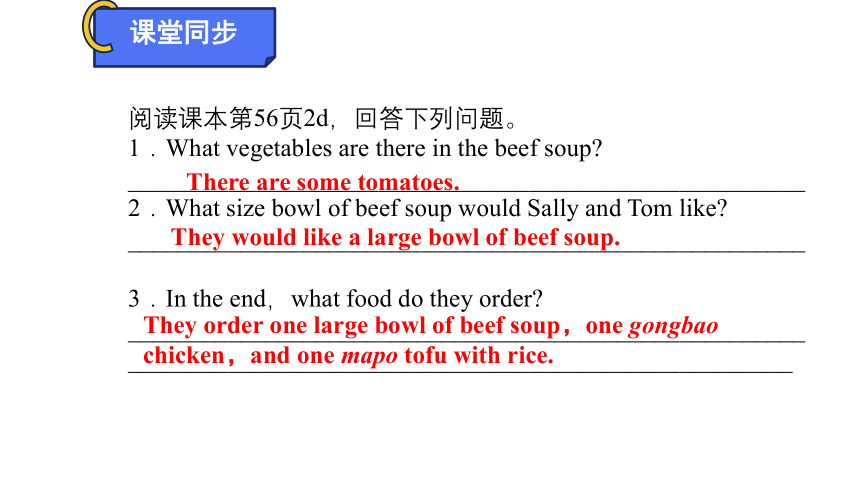


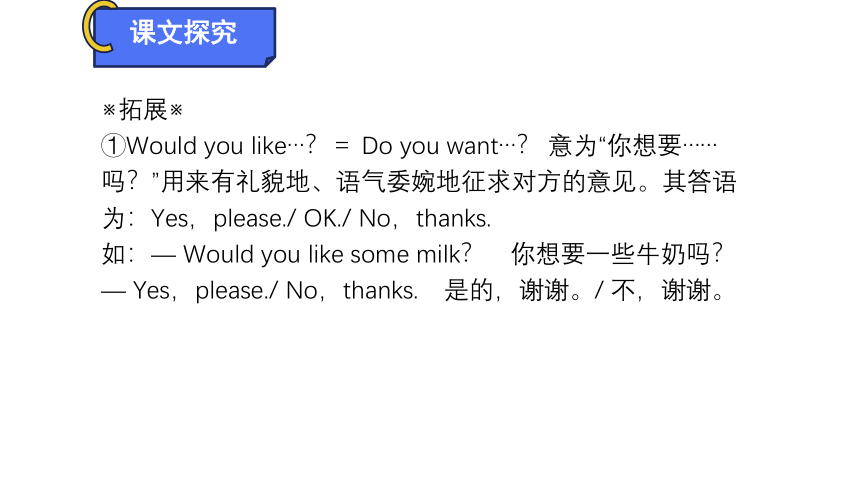

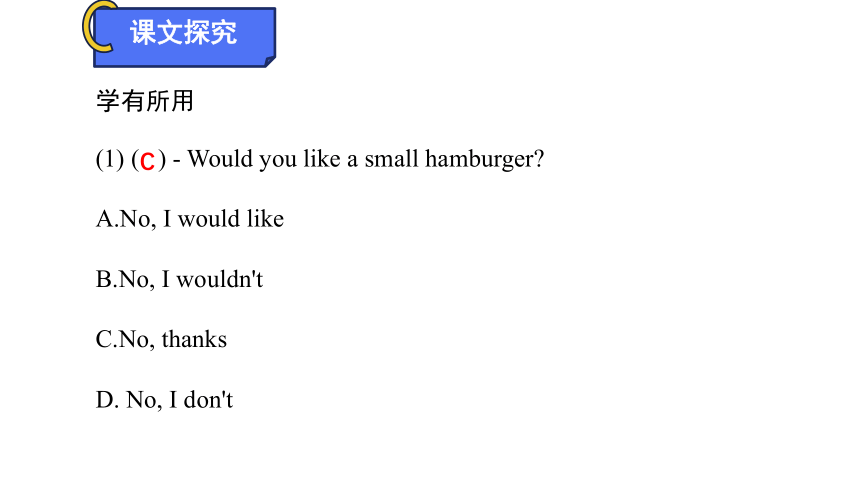
文档简介
(共46张PPT)
Part 1 Section A (1a-2d)
Unit 10 I'd like some noodles.
英语
核
心
词
汇 1.__________ n. 面条 (常用复数形式)
2.__________ n. 牛肉
3.__________ 土豆;马铃薯
4.__________ n. 特色菜;特价品 adj.特别的;特殊的
5.__________ modal v. (表示意愿)愿意
would
special
potato
beef
noodle
核
心
词
汇 6.__________adv. 还;仍然 (常用于否定句或疑问句)
7.__________ adj. 大号的;大的
8. __________ n.& v. 点菜;命令
9.__________ n. 大小;尺码
10. __________ n. 碗
11.__________ n. (可食用的)肉
yet
large
order
size
bowl
meat
重点短语 1.________________愿意;喜欢
2.________________牛肉面
3._________________什么种类
4._________________________点菜
5._______________________在牛肉汤里
6.________________________一碗……
7.____________________ 什么尺寸
8.____________________ 西红柿鸡蛋汤
9.______________________________ …一份小/中/大碗的……
10.______________________________ 加胡萝卜的牛肉面
would like
beef noodles
what kind of
take / have one's order
in the beef soup
a bowl of
what size
a small / medium / large bowl of
tomato and egg soup
beef noodles with carrots
重点句型 1.May I _____ your _____? 我可以为您点菜了吗?
2.—____ there ____ vegetables in the __________?
牛肉汤里有蔬菜吗?
—Yes.There are ______________.有的。有一些西红柿。
3.—_____________ would you like? 你想要多大碗?
—I'd like a _____________,please. 我想要一份大碗的。
take
order
Are
any
beef soup
some tomatoes
What size
large bowl
重点句型 4.
—____ there any _____ in the tomato and egg soup?
番茄鸡蛋汤里有肉吗?
—No,there _____________./ No,there's ____ meat.
不,没有。/ 不,没有肉。
5.—What _________ noodles would you like?
你想要哪种面条?
—I'd like ___________________,please. 我想要羊肉面。
Is
meat
isn't any
no
kind of
mutton noodles
阅读课本第56页2d,回答下列问题。
1.What vegetables are there in the beef soup
______________________________________________________
2.What size bowl of beef soup would Sally and Tom like
______________________________________________________
3.In the end,what food do they order
______________________________________________________
_____________________________________________________
There are some tomatoes.
They would like a large bowl of beef soup.
They order one large bowl of beef soup,one gongbao chicken,and one mapo tofu with rice.
What kind of noodles would you like? 你想要哪种面条?
(1)kind 在此句中作名词,意为“种类”。常见短语:a kind of 一种;all kinds of 各种各样的。
如:There are all kinds of flowers in the garden. 花园里有各种各样的花。
(2)would like意为“想要”,与want同义,但比want更委婉。would like中的would可缩写为'd。would like无人称和数的变化。常见搭配:would like sth.想要某物;would like to do sth.愿意/想做某事;would like sb.to do sth.想要某人做某事
如:She'd like to make friends with people from different cities.
她想和来自不同城市的人交朋友。
My mother would like me to go home early. 我妈妈想要我早点回家。
※拓展※
①Would you like…?= Do you want…? 意为“你想要……吗?”用来有礼貌地、语气委婉地征求对方的意见。其答语为:Yes,please./ OK./ No,thanks.
如:— Would you like some milk? 你想要一些牛奶吗?
— Yes,please./ No,thanks. 是的,谢谢。/ 不,谢谢。
②Would you like to do sth. 意为“你愿意做某事吗?”用来有礼貌地向对方提出建议或邀请。其答语为:Yes,I'd like (love)to./ Sorry,I'd like (love)to.But…./ Sorry,I'm afraid I can't.
如:
— Would you like to go boating with us?
你愿意和我们一起去划船吗?
— Yes,I'd love to./ Sorry,I'd love to.But I am too busy.
好的,我愿意。/ 很抱歉,我很想去,但是我太忙了。
学有所用
(1) ( ) - Would you like a small hamburger
A.No, I would like
B.No, I wouldn't
C.No, thanks
D. No, I don't
C
学有所用
(2) ( ) ——Let's do something at the party. What about_____
——No,I'd like_____.
A. to sing; to dance
B. to sing; dancing
C. singing; to dance
D. singing; dancing
C
学有所用
(3) ( ) There are different ______ of kites there.Some look like bats (蝙幅); others looklike birds.
A.kind
B.kinds
C.size
D.sizes
B
(1)这是服务员请客人点菜的礼貌用语。同义句型有:Can I take / have your order 或 Are you ready to order 其回答一般先说:“Yes,please.”然后跟上 “I'd like…” 来说明点什么餐。
如:
— May I take your order? 我可以为您点菜了吗?
— Yes.I'd like some mapo tofu with rice. 好的。我想要一些麻婆豆腐配米饭。
May I take your order? 我可以为您点菜了吗?
(2)order的用法总结。
词性词义 常用搭配 例句
作名词, 意为: 点菜; 顺序; 命令。 take / have one's order 点菜 in order 按顺序 follow one's order 听从某人的命令 in order to do sth. 为了做某事 Tom has to follow his father's order.
汤姆不得不听他父亲的命令。Number the sentences in order.
按顺序给句子编号。
In order to catch the early bus,he gets up early every day.
为了赶上早班车,他每天早起。
词性词义 常用搭配 例句
作动词 意为: 点菜; 订购; 命令。 order sb.(not) to do sth. 命令某人(不)做某事 What about ordering a bowl of soup
点一碗汤怎么样?
The mother orders her child not to play on the road.
这位母亲命令她的孩子不要在路上玩耍。
学有所用
(1)( ) ——_____________________
——Yes, I'd like some beef noodles.
A.May I take your order
B.Are there any meat in the noodles
C.What kind of noodles do you have
D.What size would you like
A
学有所用
(2) ( ) In order____the bus, he has to get up early.
A.catch
B. catches
C.catching
D. to catch
D
※辨析※ some与any
— Are there any vegetables in the beef soup?牛肉汤里有蔬菜吗?
— Yes.There are some tomatoes. 有的。有一些西红柿。
词汇 用法 例句
some 意为“一些”,既可以修饰可数名词复数又可以修饰不可数名词。常用在肯定句中。 【注意】在表示建议或请求的疑问句中,期望得到肯定回答时,多用some而不用any I have some books.我有一些书。There is some water in the bottle.瓶子里有一些水。
Would you like some coffee
你要不要来点咖啡?
※辨析※ some与any
词汇 用法 例句
any 意为“一些”,既可修饰可数名词复数又可修饰不可数名词。常用在否定句和疑问句中。 【注意】当any表示“任何”时,起强调作用时,常用肯定句中 There isn't any meat in the fridge.冰箱里没有肉了。
Do you have any friends at school
你在学校里有一些朋友吗?
Any student can answer this question.
任何学生都可以回答这个问题。
学有所用
(1) ( ) I ask her for__milk, but she doesn't have___.
A. any; some
B. some : any
C. some; some
D. any ; any
B
学有所用
(2) ( ) ——Would you like____tea with ice in it
——Yes,________.
A. any; please
B. some; please
C. any: will
D. some; will
B
学有所用
(3) ( ) —— Is there____rice in the bowl
——Yes, there is_____.
A. any; any
B. some : any
C.any: some
D. any ; any
C
size作名词,意为“(……的)大小;(鞋子、衣服等的)尺寸,尺码”。询问别人想要多大的东西时,常用what size… 提问,而不是how many size或how much size。
如
— What size (of)shoes do you take? 你穿几号鞋?
— I take size nine shoes. 我穿9号鞋。
What size would you like? 你想要多大碗?
学有所用
( ) —— What_____bowl of rice would you like, sir
——A small bowl, please.
A. price
B. time
C.size
D. height
C
————基础夯实————
一、根据音标或中文提示,填入一个形式正确、意义相符的
单词。
1.We Chinese often eat ______ / nu:dlz/ when we have a birthday.
2.There are two ___________ / p te t z// on the table.
3.— What ____ (尺寸) shoes would you like?
— Medium,please.
4.She wants to ______ (点餐) a sandwich and a glass of apple juice in the restaurant.
noodles
potatoes
size
order
5.I'd like a large _____ (碗) of beef soup,please.
6.Is there anything _______ (特别的) in today's newspaper
7.— Will you be free tonight?
— I'm not sure ____ (仍未).
bowl
special
yet
二、单项选择。
( )1.— What ________ do you have?
— We have large,medium and small bowls.
A.size
B.color
C.bowl
D.large
A
( ) 2.Would you like noodles ________ carrots in them
A.with
B.of
C.for
D.to
A
( )3.— What would you like for breakfast?
— I'd like ________.
A.tomato noodle B.tomato noodles
C.tomatoes noodle D.tomatoes noodles
B
( )4.I'd like ________ some rice and fish for supper.
A.eat
B.eats
C.eating
D.to eat
D
( ) 5.— Tim and I will eat out this weekend. Would you like to
join us
— ________.
A.Well done B.That's right C.I'd love to D.You are welcome
C
三、完成句子。
1.你想要多大码的鞋子?
_________________ of shoes would you like
2.现在您可以点菜了吗?
May I __________________________now
3.你想听哪种音乐?
________________ music would you like to listen to
What size
take / have your order
What kind of
4.我想要一大碗宫保鸡丁。
I'd like ______________ gongbao chicken.
5.你喜欢麻婆豆腐配米饭吗?
Do you like mapo ______________?
a large bowl of
tofu with rice
————能力提升————
四、完形填空。
Do you want to stay healthy Let me tell you __1__ to have a healthy diet (饮食).
In the morning,you can eat some bread,cakes and eggs.You should drink a glass of milk.It's very important for you because it can __2__ you much energy (能量).It isn't good for you to go to school or to work without __3__.
You must feel very __4__ at lunchtime.So you should have __5__ good for lunch.You can have some fish or chicken.__6__,such as carrots and tomatoes,are also very important because they can keep you healthy.
In the evening,you must be tired.You should eat things like noodles __7__ others with some vegetables.But remember not to __8__ too much because you can't do much exercise in the evening.Before going to bed,you can have a glass of milk.It can __9__ you sleep well.
At last,you should eat more __10__.Here's a proverb (谚语): An apple a day keeps the doctor away.
( ) 1.A.why B.how C.what D.when
( ) 2.A.get B.spend C.give D.take
( ) 3.A.dinner B.lunch C.tea D.breakfast
( ) 4.A.happy B.sad C.hungry D.busy
( ) 5.A.anything B.something C.nothing D.everything
( ) 6.A.Vegetables B.Meat C.Fruit D.Snacks
( ) 7.A.and B.or C.but D.so
( ) 8.A.keep B.say C.eat D.do
( ) 9.A.turn B.start C.improve D.help
( )10.A.apples B.oranges C.bananas D.pears
B
C
D
C
B
A
B
C
D
A
五、阅读理解。
Ramen noodles (拉面) are yellow noodles that originally (最初) came from China.They became a popular street food in Japan in the early 1900s.Then,after World War II,ramen became even more popular in Japan.At that time,Japan did not have much food at all.Ramen was cheap and good,so more and more people started eating it.
In the 1950s,Momofuku Ando,the man who started the Nissin food company (公司) in Japan,had an idea.He wanted to make dried ramen noodles.People put hot water over these noodles,wait for a few minutes,and then eat them.It would be instant ramen! It was not easy,but finally Ando thought of a way to make instant ramen.Japanese people loved it! Soon other companies were copying (效仿) Ando's idea.Not long after that,instant ramen spread (传播) to other countries.
Today people all over the world enjoy ramen.In fact,people eat about 40 billion (十亿) bowls,cups,or packs of ramen every year.
But the story of ramen does not end there.Ramen is now moving from the streets and instant bowls to good restaurants.All kinds of meats,vegetables and spices (香料) are being added to ramen.And people are choosing (选择) noodle bars over sushi bars (寿司店) for a nice dinner out these days.
( C )1.Where did ramen noodles originally come from
A.China.
B.Japan.
C.Australia.
D.America.
A
( )2.Which of the following kinds of ramen is NOT
mentioned (提到)
A.Instant noodles.
B.Street noodles.
C.Restaurant noodles.
D.Sushi noodles.
D
( )3.Which of these sentences is TRUE
A.Ando thought people would not like instant ramen.
B.Instant ramen was first made by accident (偶然).
C.Other Japanese companies copied Nissin's new food.
D.The Nissin company was started in 1950.
C
( )4.What does the underlined word “instant” in the second
paragraph refer to
A.美味的
B.熟的
C.优质的
D.速食的
D
( )5.What is the best title for this passage
A.The History of Ramen
B.A Man Who Ate a Lot of Ramen
C.The Way to Cook Ramen
D.Kinds of Ramen
A
Part 1 Section A (1a-2d)
Unit 10 I'd like some noodles.
英语
核
心
词
汇 1.__________ n. 面条 (常用复数形式)
2.__________ n. 牛肉
3.__________ 土豆;马铃薯
4.__________ n. 特色菜;特价品 adj.特别的;特殊的
5.__________ modal v. (表示意愿)愿意
would
special
potato
beef
noodle
核
心
词
汇 6.__________adv. 还;仍然 (常用于否定句或疑问句)
7.__________ adj. 大号的;大的
8. __________ n.& v. 点菜;命令
9.__________ n. 大小;尺码
10. __________ n. 碗
11.__________ n. (可食用的)肉
yet
large
order
size
bowl
meat
重点短语 1.________________愿意;喜欢
2.________________牛肉面
3._________________什么种类
4._________________________点菜
5._______________________在牛肉汤里
6.________________________一碗……
7.____________________ 什么尺寸
8.____________________ 西红柿鸡蛋汤
9.______________________________ …一份小/中/大碗的……
10.______________________________ 加胡萝卜的牛肉面
would like
beef noodles
what kind of
take / have one's order
in the beef soup
a bowl of
what size
a small / medium / large bowl of
tomato and egg soup
beef noodles with carrots
重点句型 1.May I _____ your _____? 我可以为您点菜了吗?
2.—____ there ____ vegetables in the __________?
牛肉汤里有蔬菜吗?
—Yes.There are ______________.有的。有一些西红柿。
3.—_____________ would you like? 你想要多大碗?
—I'd like a _____________,please. 我想要一份大碗的。
take
order
Are
any
beef soup
some tomatoes
What size
large bowl
重点句型 4.
—____ there any _____ in the tomato and egg soup?
番茄鸡蛋汤里有肉吗?
—No,there _____________./ No,there's ____ meat.
不,没有。/ 不,没有肉。
5.—What _________ noodles would you like?
你想要哪种面条?
—I'd like ___________________,please. 我想要羊肉面。
Is
meat
isn't any
no
kind of
mutton noodles
阅读课本第56页2d,回答下列问题。
1.What vegetables are there in the beef soup
______________________________________________________
2.What size bowl of beef soup would Sally and Tom like
______________________________________________________
3.In the end,what food do they order
______________________________________________________
_____________________________________________________
There are some tomatoes.
They would like a large bowl of beef soup.
They order one large bowl of beef soup,one gongbao chicken,and one mapo tofu with rice.
What kind of noodles would you like? 你想要哪种面条?
(1)kind 在此句中作名词,意为“种类”。常见短语:a kind of 一种;all kinds of 各种各样的。
如:There are all kinds of flowers in the garden. 花园里有各种各样的花。
(2)would like意为“想要”,与want同义,但比want更委婉。would like中的would可缩写为'd。would like无人称和数的变化。常见搭配:would like sth.想要某物;would like to do sth.愿意/想做某事;would like sb.to do sth.想要某人做某事
如:She'd like to make friends with people from different cities.
她想和来自不同城市的人交朋友。
My mother would like me to go home early. 我妈妈想要我早点回家。
※拓展※
①Would you like…?= Do you want…? 意为“你想要……吗?”用来有礼貌地、语气委婉地征求对方的意见。其答语为:Yes,please./ OK./ No,thanks.
如:— Would you like some milk? 你想要一些牛奶吗?
— Yes,please./ No,thanks. 是的,谢谢。/ 不,谢谢。
②Would you like to do sth. 意为“你愿意做某事吗?”用来有礼貌地向对方提出建议或邀请。其答语为:Yes,I'd like (love)to./ Sorry,I'd like (love)to.But…./ Sorry,I'm afraid I can't.
如:
— Would you like to go boating with us?
你愿意和我们一起去划船吗?
— Yes,I'd love to./ Sorry,I'd love to.But I am too busy.
好的,我愿意。/ 很抱歉,我很想去,但是我太忙了。
学有所用
(1) ( ) - Would you like a small hamburger
A.No, I would like
B.No, I wouldn't
C.No, thanks
D. No, I don't
C
学有所用
(2) ( ) ——Let's do something at the party. What about_____
——No,I'd like_____.
A. to sing; to dance
B. to sing; dancing
C. singing; to dance
D. singing; dancing
C
学有所用
(3) ( ) There are different ______ of kites there.Some look like bats (蝙幅); others looklike birds.
A.kind
B.kinds
C.size
D.sizes
B
(1)这是服务员请客人点菜的礼貌用语。同义句型有:Can I take / have your order 或 Are you ready to order 其回答一般先说:“Yes,please.”然后跟上 “I'd like…” 来说明点什么餐。
如:
— May I take your order? 我可以为您点菜了吗?
— Yes.I'd like some mapo tofu with rice. 好的。我想要一些麻婆豆腐配米饭。
May I take your order? 我可以为您点菜了吗?
(2)order的用法总结。
词性词义 常用搭配 例句
作名词, 意为: 点菜; 顺序; 命令。 take / have one's order 点菜 in order 按顺序 follow one's order 听从某人的命令 in order to do sth. 为了做某事 Tom has to follow his father's order.
汤姆不得不听他父亲的命令。Number the sentences in order.
按顺序给句子编号。
In order to catch the early bus,he gets up early every day.
为了赶上早班车,他每天早起。
词性词义 常用搭配 例句
作动词 意为: 点菜; 订购; 命令。 order sb.(not) to do sth. 命令某人(不)做某事 What about ordering a bowl of soup
点一碗汤怎么样?
The mother orders her child not to play on the road.
这位母亲命令她的孩子不要在路上玩耍。
学有所用
(1)( ) ——_____________________
——Yes, I'd like some beef noodles.
A.May I take your order
B.Are there any meat in the noodles
C.What kind of noodles do you have
D.What size would you like
A
学有所用
(2) ( ) In order____the bus, he has to get up early.
A.catch
B. catches
C.catching
D. to catch
D
※辨析※ some与any
— Are there any vegetables in the beef soup?牛肉汤里有蔬菜吗?
— Yes.There are some tomatoes. 有的。有一些西红柿。
词汇 用法 例句
some 意为“一些”,既可以修饰可数名词复数又可以修饰不可数名词。常用在肯定句中。 【注意】在表示建议或请求的疑问句中,期望得到肯定回答时,多用some而不用any I have some books.我有一些书。There is some water in the bottle.瓶子里有一些水。
Would you like some coffee
你要不要来点咖啡?
※辨析※ some与any
词汇 用法 例句
any 意为“一些”,既可修饰可数名词复数又可修饰不可数名词。常用在否定句和疑问句中。 【注意】当any表示“任何”时,起强调作用时,常用肯定句中 There isn't any meat in the fridge.冰箱里没有肉了。
Do you have any friends at school
你在学校里有一些朋友吗?
Any student can answer this question.
任何学生都可以回答这个问题。
学有所用
(1) ( ) I ask her for__milk, but she doesn't have___.
A. any; some
B. some : any
C. some; some
D. any ; any
B
学有所用
(2) ( ) ——Would you like____tea with ice in it
——Yes,________.
A. any; please
B. some; please
C. any: will
D. some; will
B
学有所用
(3) ( ) —— Is there____rice in the bowl
——Yes, there is_____.
A. any; any
B. some : any
C.any: some
D. any ; any
C
size作名词,意为“(……的)大小;(鞋子、衣服等的)尺寸,尺码”。询问别人想要多大的东西时,常用what size… 提问,而不是how many size或how much size。
如
— What size (of)shoes do you take? 你穿几号鞋?
— I take size nine shoes. 我穿9号鞋。
What size would you like? 你想要多大碗?
学有所用
( ) —— What_____bowl of rice would you like, sir
——A small bowl, please.
A. price
B. time
C.size
D. height
C
————基础夯实————
一、根据音标或中文提示,填入一个形式正确、意义相符的
单词。
1.We Chinese often eat ______ / nu:dlz/ when we have a birthday.
2.There are two ___________ / p te t z// on the table.
3.— What ____ (尺寸) shoes would you like?
— Medium,please.
4.She wants to ______ (点餐) a sandwich and a glass of apple juice in the restaurant.
noodles
potatoes
size
order
5.I'd like a large _____ (碗) of beef soup,please.
6.Is there anything _______ (特别的) in today's newspaper
7.— Will you be free tonight?
— I'm not sure ____ (仍未).
bowl
special
yet
二、单项选择。
( )1.— What ________ do you have?
— We have large,medium and small bowls.
A.size
B.color
C.bowl
D.large
A
( ) 2.Would you like noodles ________ carrots in them
A.with
B.of
C.for
D.to
A
( )3.— What would you like for breakfast?
— I'd like ________.
A.tomato noodle B.tomato noodles
C.tomatoes noodle D.tomatoes noodles
B
( )4.I'd like ________ some rice and fish for supper.
A.eat
B.eats
C.eating
D.to eat
D
( ) 5.— Tim and I will eat out this weekend. Would you like to
join us
— ________.
A.Well done B.That's right C.I'd love to D.You are welcome
C
三、完成句子。
1.你想要多大码的鞋子?
_________________ of shoes would you like
2.现在您可以点菜了吗?
May I __________________________now
3.你想听哪种音乐?
________________ music would you like to listen to
What size
take / have your order
What kind of
4.我想要一大碗宫保鸡丁。
I'd like ______________ gongbao chicken.
5.你喜欢麻婆豆腐配米饭吗?
Do you like mapo ______________?
a large bowl of
tofu with rice
————能力提升————
四、完形填空。
Do you want to stay healthy Let me tell you __1__ to have a healthy diet (饮食).
In the morning,you can eat some bread,cakes and eggs.You should drink a glass of milk.It's very important for you because it can __2__ you much energy (能量).It isn't good for you to go to school or to work without __3__.
You must feel very __4__ at lunchtime.So you should have __5__ good for lunch.You can have some fish or chicken.__6__,such as carrots and tomatoes,are also very important because they can keep you healthy.
In the evening,you must be tired.You should eat things like noodles __7__ others with some vegetables.But remember not to __8__ too much because you can't do much exercise in the evening.Before going to bed,you can have a glass of milk.It can __9__ you sleep well.
At last,you should eat more __10__.Here's a proverb (谚语): An apple a day keeps the doctor away.
( ) 1.A.why B.how C.what D.when
( ) 2.A.get B.spend C.give D.take
( ) 3.A.dinner B.lunch C.tea D.breakfast
( ) 4.A.happy B.sad C.hungry D.busy
( ) 5.A.anything B.something C.nothing D.everything
( ) 6.A.Vegetables B.Meat C.Fruit D.Snacks
( ) 7.A.and B.or C.but D.so
( ) 8.A.keep B.say C.eat D.do
( ) 9.A.turn B.start C.improve D.help
( )10.A.apples B.oranges C.bananas D.pears
B
C
D
C
B
A
B
C
D
A
五、阅读理解。
Ramen noodles (拉面) are yellow noodles that originally (最初) came from China.They became a popular street food in Japan in the early 1900s.Then,after World War II,ramen became even more popular in Japan.At that time,Japan did not have much food at all.Ramen was cheap and good,so more and more people started eating it.
In the 1950s,Momofuku Ando,the man who started the Nissin food company (公司) in Japan,had an idea.He wanted to make dried ramen noodles.People put hot water over these noodles,wait for a few minutes,and then eat them.It would be instant ramen! It was not easy,but finally Ando thought of a way to make instant ramen.Japanese people loved it! Soon other companies were copying (效仿) Ando's idea.Not long after that,instant ramen spread (传播) to other countries.
Today people all over the world enjoy ramen.In fact,people eat about 40 billion (十亿) bowls,cups,or packs of ramen every year.
But the story of ramen does not end there.Ramen is now moving from the streets and instant bowls to good restaurants.All kinds of meats,vegetables and spices (香料) are being added to ramen.And people are choosing (选择) noodle bars over sushi bars (寿司店) for a nice dinner out these days.
( C )1.Where did ramen noodles originally come from
A.China.
B.Japan.
C.Australia.
D.America.
A
( )2.Which of the following kinds of ramen is NOT
mentioned (提到)
A.Instant noodles.
B.Street noodles.
C.Restaurant noodles.
D.Sushi noodles.
D
( )3.Which of these sentences is TRUE
A.Ando thought people would not like instant ramen.
B.Instant ramen was first made by accident (偶然).
C.Other Japanese companies copied Nissin's new food.
D.The Nissin company was started in 1950.
C
( )4.What does the underlined word “instant” in the second
paragraph refer to
A.美味的
B.熟的
C.优质的
D.速食的
D
( )5.What is the best title for this passage
A.The History of Ramen
B.A Man Who Ate a Lot of Ramen
C.The Way to Cook Ramen
D.Kinds of Ramen
A
同课章节目录
- Unit 1 Can you play the guitar?
- Section A
- Section B
- Unit 2 What time do you go to school?
- Section A
- Section B
- Unit 3 How do you get to school?
- Section A
- Section B
- Unit 4 Don't eat in class.
- Section A
- Section B
- Unit 5 Why do you like pandas?
- Section A
- Section B
- Unit 6 I'm watching TV.
- Section A
- Section B
- Review of Units 1-6
- Unit 7 It's raining!
- Section A
- Section B
- Unit 8 Is there a post office near here?
- Section A
- Section B
- Unit 9 What does he look like?
- Section A
- Section B
- Unit 10 I'd like some noodles.
- Section A
- Section B
- Unit 11 How was your school trip?
- Section A
- Section B
- Unit 12 What did you do last weekend?
- Section A
- Section B
